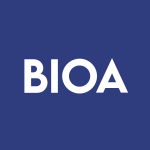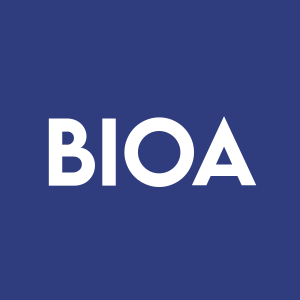Welcome to our dedicated page for BioAge Labs news (Ticker: BIOA), a resource for investors and traders seeking the latest updates and insights on BioAge Labs stock.
BioAge Labs Inc. (BIOA) is a clinical-stage biopharmaceutical company developing therapies targeting aging biology to treat metabolic diseases and neuroinflammation. This page provides investors and industry professionals with verified updates on the company’s progress, including clinical trial developments, strategic partnerships, and regulatory milestones.
Access the latest press releases and news articles covering BIOA’s pipeline advancements, such as its apelin receptor agonist Azelaprag (BGE-105) for obesity and BGE-100 for neuroinflammatory conditions. Stay informed about preclinical research outcomes, financial disclosures, and collaborations shaping the company’s innovative approach to age-related diseases.
Key updates include trial phase results, FDA communications, and analyses of BIOA’s unique position in the competitive biopharma landscape. Bookmark this page for real-time insights into how BioAge Labs leverages aging biology to address complex health challenges.
BioArctic AB (Nasdaq Stockholm: BIOA B) announced that Australia's Therapeutic Goods Administration (TGA) has approved Leqembi (lecanemab) for treating early Alzheimer's disease. The approval specifically targets adult patients with mild cognitive impairment or mild dementia who are apolipoprotein E ε4 non-carriers or heterozygotes with confirmed amyloid pathology.
This approval follows a review process initiated in March 2025 after an initial rejection in February 2025. Leqembi, developed through collaboration between BioArctic and Eisai, originated from Professor Lars Lannfelt's research on the Arctic mutation in Alzheimer's disease. While Eisai leads global commercialization, BioArctic maintains Nordic region commercialization rights in partnership with Eisai.
BioAge Labs (NASDAQ:BIOA) has initiated a Phase 1 clinical study of BGE-102, a novel brain-penetrant NLRP3 inhibitor developed in collaboration with HitGen (SSE:688222). The drug candidate, discovered using HitGen's DNA-encoded library (DEL) technology platform, is being developed initially for obesity treatment.
BGE-102 is an orally available small molecule that targets NLRP3, a key driver of age-related inflammation implicated in neurodegenerative conditions, cardiovascular disease, and metabolic disorders. The clinical trial initiation triggers an undisclosed milestone payment to HitGen under their collaboration agreement.
The partnership, which began with successful hit identification in April 2021, has resulted in joint patent filings and a published research paper in February 2024. Both companies continue to collaborate on additional drug discovery programs using HitGen's DEL platform, which contains over 1.2 trillion small molecules.
BioArctic (NASDAQ STOCKHOLM: BIOA B) announced that CEO Gunilla Osswald has been named Uppsala University's Alumnus of the Year 2025. The recognition highlights her exemplary leadership and contributions to scientific innovation, particularly in the development of lecanemab for Alzheimer's disease.
Earlier in March 2025, Osswald and BioArctic's founders were also awarded the university's Innovation and Entrepreneurship Prize. The university praised her visionary and inclusive leadership style, noting her ability to foster collaboration and serve as a role model for women in science and technology.
BioArctic AB (Nasdaq Stockholm: BIOA-B) announced that its two founders and main shareholders, Lars Lannfelt and Pär Gellerfors, plan to sell a minor portion of their shareholdings in the company. The company disclosed this information in compliance with EU Market Abuse Regulation requirements.
BioArctic AB (Nasdaq Stockholm: BIOA B) announced that its partner Eisai has initiated a rolling submission of a Supplemental Biologics License Application (sBLA) to the FDA for Leqembi Iqlik's subcutaneous autoinjector as a weekly starting dose for early Alzheimer's disease treatment. This follows the recent approval of Leqembi Iqlik for maintenance dosing in the US on August 29, 2025.
If approved, Leqembi Iqlik would become the first anti-amyloid treatment offering at-home injection from start to maintenance. The proposed dosing regimen includes 500 mg SC dosing (two 250 mg injections) weekly, as an alternative to bi-weekly intravenous dosing. The autoinjector requires only 15 seconds per injection and could potentially reduce healthcare resources associated with IV administration.
Leqembi, currently approved in 48 countries and under review in 10 others, uniquely targets both amyloid plaque and protofibrils in Alzheimer's disease treatment.
BioArctic AB (Nasdaq Stockholm: BIOA-B) announced that its partner Eisai received FDA approval for LEQEMBI IQKLIK™, a subcutaneous autoinjector version of lecanemab for maintenance treatment of early Alzheimer's disease. The new formulation will launch on October 6, 2025.
After 18 months of initial Leqembi intravenous treatment, patients can either continue with IV infusions every four weeks or switch to the new weekly 360 mg subcutaneous injection. Leqembi uniquely targets both amyloid plaque and protofibrils, potentially impacting tau accumulation. The treatment aims to slow disease progression and maintain therapeutic benefits through continuous maintenance therapy.
BioArctic (Nasdaq Stockholm: BIOA B) has entered into a significant collaboration agreement with Novartis Pharma AG to develop potential neurodegeneration treatments using BioArctic's proprietary BrainTransporter technology. The deal includes an upfront payment of $30 million to BioArctic.
Under the agreement, BioArctic will develop a new drug candidate combining their BrainTransporter technology with Novartis' proprietary antibody. If Novartis exercises their option following evaluation, they could pay up to $772 million in additional milestone payments plus mid-single digit royalties on future global sales. This marks BioArctic's third partnership utilizing their BrainTransporter platform, which enhances brain uptake of therapeutic agents through blood-brain barrier biology.
BioArctic AB (NASDAQ Stockholm: BIOA B) announced the EU launch of Leqembi®, the first therapy targeting an underlying cause of Alzheimer's disease, starting in Austria on August 25, 2025, and Germany on September 1, 2025.
The drug, approved by the European Commission in April 2025, is indicated for adult patients with mild cognitive impairment and mild dementia due to early Alzheimer's disease who are ApoE ε4 non-carriers or heterozygotes with confirmed amyloid pathology. In clinical trials, Leqembi demonstrated a 31% reduction in clinical decline at 18 months compared to placebo in the EU indicated population.
The treatment uniquely targets both amyloid plaque and protofibrils, potentially impacting tau accumulation. Common adverse reactions include infusion-related reactions (26%), ARIA-H (13%), headache (11%), and ARIA-E (9%).
BioArctic AB (NASDAQ Stockholm: BIOA B) has announced the upcoming release of its Q2 2025 financial report on August 28, 2025, at 08:00 a.m. CET. The company will host an audiocast with teleconference in English at 09:30 CET featuring CEO Gunilla Osswald, CFO Anders Martin-Löf, and other executives who will present and discuss the quarterly results.
The presentation will be accessible via webcast and teleconference, with opportunities for participants to ask questions either written or verbally. The webcast recording will be available on-demand through BioArctic's corporate website after the event.
BioAge Labs (NASDAQ: BIOA), a clinical-stage biotechnology company focused on developing therapeutics for metabolic diseases through aging biology, has announced its participation in two major investor conferences in September 2025.
The company will present at Citi's 2025 Biopharma Back to School Conference in Boston (September 2-3) and the Morgan Stanley 23rd Annual Global Healthcare Conference in New York (September 8-10). CEO Kristen Fortney and CFO Dov Goldstein will conduct fireside chats and one-on-one meetings at both events. Webcasts will be available live and archived for 30 days on the company's investor relations website.


